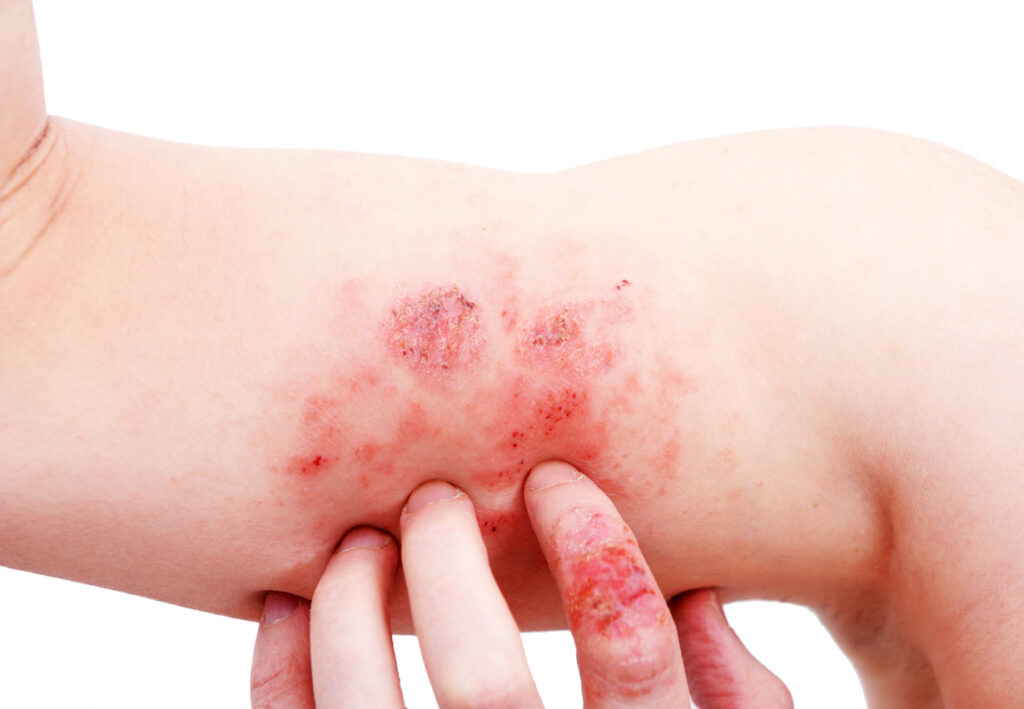Concerto Biosciences’ ENS-002, a topical three-strain live biotherapeutic product for mild-to-moderate atopic dermatitis (AD), showed promise in a first-in-human Phase 1b clinical trial, according to top-line results.
ENS-002 was safe and well-tolerated with no drug-related adverse events, meeting its primary endpoint. Secondary endpoints were positive: Eczema symptoms improved, and Staphylococcus aureus (S. aureus) was suppressed without disturbing the skin’s beneficial microbes.
ENS-002 consists of three skin-derived, clonal, commensal, and non-pathogenic bacterial strains delivered at an equal ratio and has been designed to inhibit S. aureus proliferation and virulence while preserving the skin’s beneficial microbe. It was discovered using Concerto’s kChip platform, which screened millions of microbial combinations to identify a trio of skin‑dwelling strains that, together, robustly inhibit S. aureus behaviors across varied community contexts.
The Phase 1b study was designed to establish safety and investigate early signals of efficacy to better inform dose, schedule, and endpoints for Phase 2. The open-label trial enrolled eight adults with mild-to-moderate AD into two sequential dosing cohorts (Cohort 1: lower dose; Cohort 2: higher dose). Each cohort was followed by a one‑month post‑treatment monitoring period to assess durability of effect.
The primary endpoint was safety and tolerability, assessed by the incidence of adverse events, dose-limiting toxicity, laboratory abnormalities, and physical exam. Secondary endpoints included ENS-002 strain levels (treated and untreated sites), S. aureus levels (treated and untreated sites), and eczema severity scores. Exploratory endpoints included microbiome diversity and levels of key commensal taxa.
Assessments were conducted at baseline, throughout the ENS-002 administration period, and throughout a one‑month post-administration follow‑up.
Key results included:
- Safe and well-tolerated: All eight participants completed administration with no drug‑related or serious adverse events and no discontinuations.
- Dose-dependent and durable clinical improvement: Both cohorts showed reductions in eczema severity during the 1–2 weeks of administration that persisted through the post-administration phase. Overall, Eczema Area and Severity Index (EASI) improved in 3/4 participants in Cohort 1 (lower dose) and 4/4 participants in Cohort 2 (higher dose); and peak pruritus decreased in 2/4 participants in Cohort 1 and in 4/4 participants in Cohort 2.
- Strong drug presence: ENS-002 reached appreciable relative abundance at treated sites during dosing.
- Targeted suppression of S. aureus: On treated S. aureus-positive lesions, S. aureus levels fell sharply—often to near zero—and no new S. aureus growth appeared on previously negative or untreated skin.
- Preservation of protective microbes: Naturally occurring skin bacteria, including Corynebacterium, coagulase-negative Staphylococcus, and Micrococcus, fluctuated minimally throughout administration and follow-up, distinguishing ENS-002 from antibiotics that disrupt healthy microbial communities.
“The combination of targeted S. aureus suppression, preservation of the healthy skin microbiome, and measurable symptom improvement is rare—and exciting,” says Peter A. Lio, MD, Founder of the Chicago Integrative Eczema Center in Chicago, IL, and a member of Concerto’s Scientific Advisory Board, in a news release. “The possibility of offering patients a therapy that’s safe enough for ongoing use and simple enough to stick with could fundamentally change how we manage mild-to-moderate disease.”
Now, Concerto plans to conduct vehicle-controlled clinical assessments of ENS‑002 safety and efficacy across adult and pediatric patients. In addition, a future study to evaluate lower‑frequency maintenance dosing to verify durability and remittive effect is planned.


